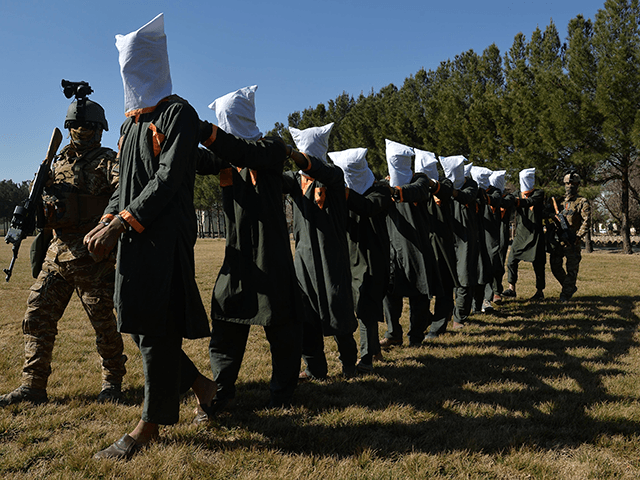The Taliban issued an official statement Tuesday warning leaders in the terrorist group they will face internal punishment if they allow non-Afghan citizens into the group or otherwise “harbor” them.
The statement follows repeated warnings from the administration of President Joe Biden that Washington may not keep its promise to withdraw fully from Afghanistan by May if the Taliban does not adhere to the two major promises it made in a peace deal with the prior Trump administration: to stop harboring members of international terrorist groups, particularly al-Qaeda, and to stop attacking U.S. soldiers.
The Pentagon recently observed one year without U.S. military deaths in Afghanistan, partly due to the peace agreement brokered by Secretary of State Mike Pompeo last year. The Taliban has significantly refocused its attention to attacking the legitimate government of Afghanistan, resulting in minimal American casualties but escalating violence hurting Afghan security forces.
The Taliban considers itself the legitimate government of the “Islamic Emirate of Afghanistan” and has repeatedly refused to negotiate with Kabul, whose leaders it deems imposters.
The Taliban directive, published in part by Afghan news outlet Tolo News on Tuesday, appears to be a response to Western experts stating that evidence suggests that Taliban has not sufficiently distanced itself from global jihadist groups.
“All heads and mujahedeen are directed to avoid arbitrary move to bring in foreign nationals into their ranks or harbor them,” the statement read, vowing that those caught harboring foreigners “will be referred to the military affairs commission for further punishment.”
The Taliban strictly enforces the implementation of sharia, or the Islamic law, among its ranks and forced the entire Afghan nation to live under sharia when it ruled the country. The statement did not specify, other than having their battalions defunded, what “punishment” those who continued to harbor foreigners would face.
Tolo News noted that the United Nations estimated that up to 500 members of al-Qaeda were active in Afghanistan, cooperating with the Taliban. The Taliban has a hostile relationship with the Islamic State – an al-Qaeda offshoot – that has escalated as its Afghan wing, the Khorasan province, has attempted to conquer opium-growing territory traditionally held by the Taliban.
Under an agreement brokered last year, the United States agreed to withdraw all its troops from Afghanistan – ending the two-decade-old war – in exchange for the Taliban ceasing attacks on American soldiers and cutting ties with foreign troops. That withdrawal appears in jeopardy, as the Biden administration has issued statements suggesting that the Taliban had not lived up to its end of the deal sufficiently for Washington to feel that a withdrawal was safe and judicious.
The most recent statement of doubt regarding the withdrawal came from Pentagon chief Lloyd Austin last week, addressing NATO. The United States invoked Article 5 of the North Atlantic Treaty to request that NATO help invade Afghanistan in the aftermath of the September 11, 2001, terrorist attacks.
A readout of Austin’s statement to NATO read in part, “[Austin] reassured Allies that the U.S. would not undertake a hasty or disorderly withdrawal from Afghanistan,” a message many interpreted to mean that the end of the Afghan war was not imminent for the United States.
Prior to Austin’s remarks, Pentagon spokesman John Kirby accused the Taliban of breaking the peace deal and appeared to urge reporters to leave space open for a potential change in the deadline. “We are still involved in trying to get a negotiated settlement. The Taliban have not met their commitments,” Kirby said in January. “As you know, there is a looming deadline of early May … but without them meeting our commitments to renounce terrorism and to stop the violent attacks on the Afghan National security forces and by dint of that the Afghan people, it’s very hard to see a specific way forward for the negotiated settlement.”
The Taliban responded to those signals last week by issuing an open letter to America asking its troops to leave.
“The Islamic Emirate of Afghanistan [the Taliban] is sincerely committed to finding a political solution to the ongoing conflict and therefore, took the initiative by opening a political office in the nation of Qatar towards this end,” the head of the Taliban, Mullah Abdul Ghani Baradar, wrote. “Now that a year has passed since the signing of the Doha agreement, we urge the American side to remain committed to the full implementation of this accord.”
Follow Frances Martel on Facebook and Twitter.

COMMENTS
Please let us know if you're having issues with commenting.